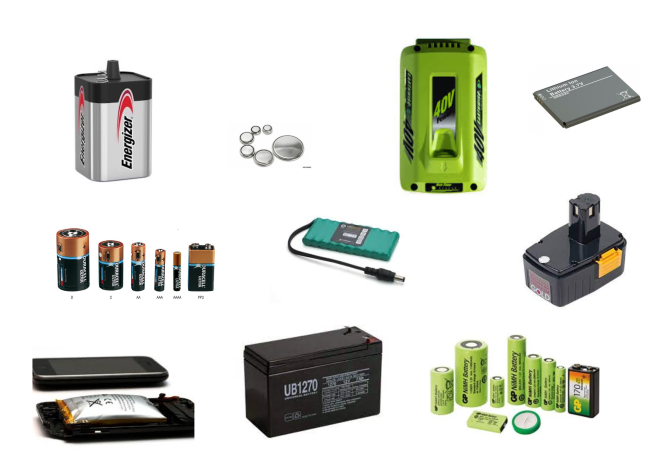NEW in 2026: Illinois Battery Stewardship Act Program
Batteries are recyclable, but not in your curbside cart! Bring them to a drop-off instead!
In 2024, the Illinois Battery Stewardship Act was signed into law. Implementation of a battery recycling program started on January 1, 2026. There are now more locations, including Kane County's Fabyan Parkway Recycling Center, where residents can drop off almost all common battery types for free recycling. Residents are strongly encouraged to use Fabyan or other sites to recycle accepted batteries. It will become illegal to dispose of any accepted battery in trash or curbside recycling starting January 1, 2028.
What Batteries are Included in the Program?
Portable batteries - These are small, single use and rechargeable batteries. They include alkaline batteries (standard AA, AAA, C, D, 6 Volt, 9 Volt sizes), button and coin cell batteries, and smaller rechargeable batteries that power small electronics, power tools, etc.
Medium format batteries - These are larger, somewhat more powerful rechargeable batteries, weighing between 11 and 25 pounds or having a rating between 300 and 2000 Watt-hours. These are larger rechargeable batteries that power cordless electric lawnmowers, snowblowers, e-bikes and scooters.
Damaged and defective batteries - These are lithium chemistry batteries that show some external sign of damage, such as bloating, swelling, case cracking or melting/charring. See our page on damaged lithium batteries to learn how to recognize problems and how to reduce risks at home.

Batteries that are accepted at Fabyan Parkway Recycling Center under the Battery Stewardship Program
What Batteries are NOT Included in the Program?
Open cell lead acid batteries (e.g., car and boat batteries) - These batteries are covered by a separate part of the Illinois Environmental Protection Act. It is illegal to put a lead acid battery in the trash. Retailers of car batteries, battery specialty stores like Batteries Plus, household hazardous waste programs, and metal scrap facilities accept open cell batteries for recycling
Larger sealed lead acid batteries - There is a weight limit of 11 pounds for lead acid batteries through this program. Take heavier sealed lead acid batteries, such as sump pump/basement back-up systems, to a battery specialty store like Batteries Plus or to a metal scrap facility.
Large lithium batteries - Large lithium batteries from electric vehicles are not accepted. These should be recycled through the vehicle manufacturer.
Where to Recycle Batteries in Kane County?
Both Kane County and Elgin Township offer convenient, free battery recycling programs under the new stewardship program:
Kane County: Batteries are accepted Monday - Friday, 8am - 4pm at the Fabyan Parkway Recycling Center and near the first floor auditorium of Government Center Building A (719 S. Batavia Ave., Geneva) also on weekdays from 8:30am - 4:30pm. Additionally, the County will be accepting batteries at most recycling events in 2026.
- Please bring batteries to center and events in a separate containers from other recyclables (any container type is fine)
- Batteries do not need to be taped
- Please keep any damaged lithium batteries separate from other batteries and make sure the site attendant or event volunteer knows they are taking a damaged battery
Elgin Township: The Township maintains four unmanned kiosks where batteries can be dropped off 24/7. They are at the following locations:
- Elgin Township Highway Garage, 725 S. McLean Blvd., Elgin
- Elgin Fire Department, Station 2, 650 Big Timber Rd., Elgin
- Elgin Fire District Annex, 8N709 Stevens Rd., Elgin
- Pingree Grove Fire Station, 39W160 Plank Rd., Elgin
Retail Recycling Partners: The Battery Network, the non-profit organization responsible for implementing the state battery stewardship program, is working with corporate partners, including Lowe's and Home Depot, to expand existing rechargeable battery recycling programs to include non-rechargeables.
We recommend double-checking with your local Lowe's or Home Depot store to confirm what type of batteries are accepted before bringing them in. Retail locations do not accept damaged lithium batteries - these are best brought to the
Fabyan Recycling Center, the
Naperville HHW site, or by appointment to the Recycling Program Office (call 630-208-3841 for help).
Battery Collection Site Locator: The Battery Network maintains the
official locator tool of participating drop off sites across the whole state. Search by zip code!
Note: Kane County does not endorse any particular battery manufacturer or recycler. All names and images are for illustrative purposes only.